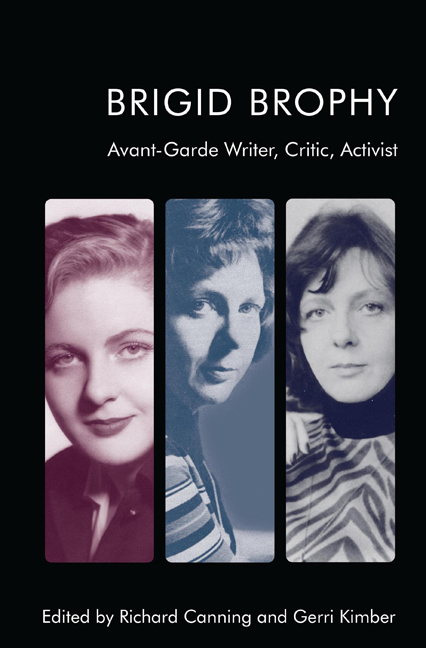Book contents
- Frontmatter
- Contents
- List of Illustrations
- Acknowledgements
- Introduction
- 1 Embodying the Fragments: A Refl ection on the Reluctant Auto-Biography of Brigid Brophy
- 2 Brigid Brophy’s Paradoxical World of Childhood
- 3 Intr oduction to ‘The Librarian and the Novel’
- 4 The Librarian and the Novel: A Writer’s View
- 5 Penetrating (the) Prancing Novelist
- 6 ‘Shavian that she was’
- 7 ‘Il faut que je vive’: Brigid Brophy and Animal Rights
- 8 Brigid Brophy’s Phenomenology of Sex in Flesh and The Snow Ball
- 9 Letter to Brigid
- 10 Encoding Love: Hidden Correspondence in the Fiction of Brigid Brophy and Iris Murdoch
- 11 ‘Heads and Boxes’: A Prop Art Exhibition Collaboration by Brigid Brophy and Maureen Duffy
- 12 Prancing Novelist and Black and White: Experiments in Biography
- 13 ‘Mo nster Cupid’: Brophy, Camp and The Snow Ball
- 14 ‘A Felicitous Day for Fish’
- 15 The Dissenting Feminist
- 16 A Certain Detachment?
- Notes on Contributors
- Index
10 - Encoding Love: Hidden Correspondence in the Fiction of Brigid Brophy and Iris Murdoch
Published online by Cambridge University Press: 17 October 2020
- Frontmatter
- Contents
- List of Illustrations
- Acknowledgements
- Introduction
- 1 Embodying the Fragments: A Refl ection on the Reluctant Auto-Biography of Brigid Brophy
- 2 Brigid Brophy’s Paradoxical World of Childhood
- 3 Intr oduction to ‘The Librarian and the Novel’
- 4 The Librarian and the Novel: A Writer’s View
- 5 Penetrating (the) Prancing Novelist
- 6 ‘Shavian that she was’
- 7 ‘Il faut que je vive’: Brigid Brophy and Animal Rights
- 8 Brigid Brophy’s Phenomenology of Sex in Flesh and The Snow Ball
- 9 Letter to Brigid
- 10 Encoding Love: Hidden Correspondence in the Fiction of Brigid Brophy and Iris Murdoch
- 11 ‘Heads and Boxes’: A Prop Art Exhibition Collaboration by Brigid Brophy and Maureen Duffy
- 12 Prancing Novelist and Black and White: Experiments in Biography
- 13 ‘Mo nster Cupid’: Brophy, Camp and The Snow Ball
- 14 ‘A Felicitous Day for Fish’
- 15 The Dissenting Feminist
- 16 A Certain Detachment?
- Notes on Contributors
- Index
Summary
The relationship between Brigid Brophy and Iris Murdoch has had an interesting academic afterlife. At first considered a minor footnote in the life of Murdoch, and unknown to many before the turn of the twenty-first century, it has, since the discovery of over a thousand letters from Murdoch to Brophy, gained greater prominence.1 It is now clear that their relationship, which lasted from approximately the end of 1954 to 1967, should be considered one of the most important in Murdoch's life – of equal standing as those with Philippa Foot, Raymond Queneau, Frank Thompson, Elias Canetti and Franz Steiner; perhaps only her relationship with her husband John Bayley, and with her parents, exerted greater influence than these.
Although a full biography of Brophy has yet to be written, it would appear that she was far more stable in her same-sex relationships, throughout her life. Both she and Murdoch were in fairly open marriages, and both husbands were aware of their wives’ activities with others; Murdoch, however, kept hers a secret from Bayley, whereas Brophy made it clear to her husband, Michael Levey. While Murdoch was involved with Brophy she had other ongoing relationships, ones that she would later term ‘diffused eroticisms’ in a letter to Brophy in 1967, whereas Brophy, it appears, did not. The relationship broke down in 1967 as Murdoch would not commit to Brophy, nor would she give herself physically, both of which Brophy required, as she outlined over the course of many letters. As a new lover, Maureen Duffy, came on the scene the relationship faded and became strained, although they kept in intermittent touch until Brophy's death in 1995. Their epistolary relationship has now been well documented in Living on Paper: Letters from Iris Murdoch 1934–1995 (2015), although this collection contains only a fraction of the thousand or more letters that Murdoch wrote to Brophy.
It is the contention of this essay that their relationship becomes encoded in their fictional work of this period, although there are some caveats to this.
- Type
- Chapter
- Information
- Brigid BrophyAvant-Garde Writer, Critic, Activist, pp. 143 - 161Publisher: Edinburgh University PressPrint publication year: 2020



